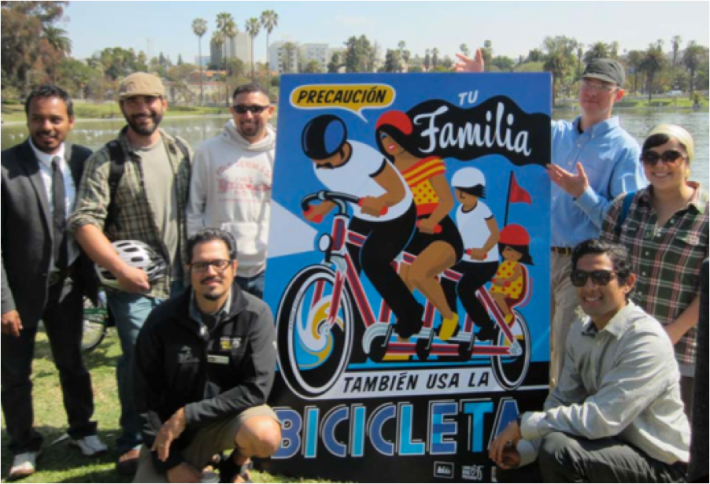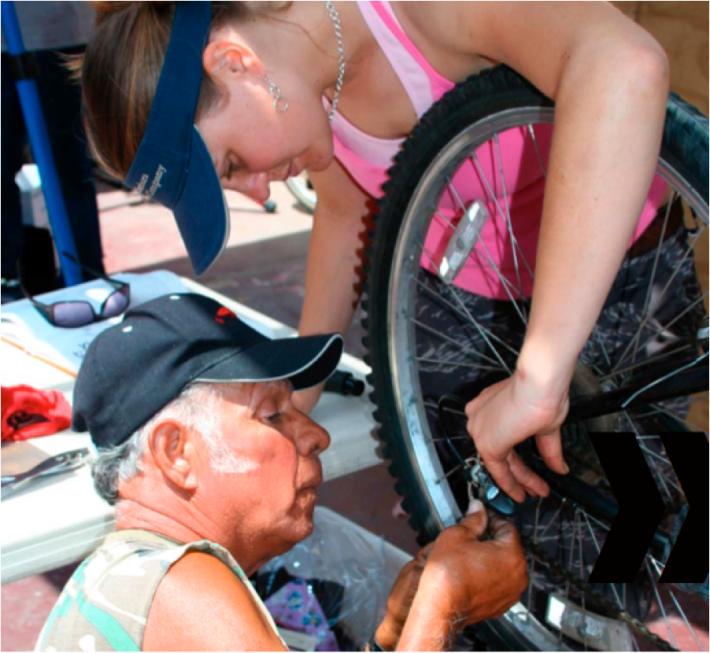Conquering the Unbearable Whiteness of Bike Advocacy: An Equity How-To
3:44 PM EDT on October 14, 2014

Many bicycle advocacy groups find themselves in a sticky position today: They’re increasingly aware that their membership doesn’t reflect the diversity of the broader population, but they’re not sure how to go about recruiting new members, or how to do it in a way that doesn’t amount to tokenism.
The League of American Bicyclists has been working hard to address equity in the bike movement, and their collaboration with a wide variety of local groups has led them to share some of the most successful practices in a new report, The New Movement: Bike Equity Today. Here are some how-tos, drawn from the report, for people who want to bring new voices into the movement.
Listen. How can bike advocates be sure that the infrastructure solutions and education programs they're promoting work for everyone unless they ask everyone -- or better yet, get everyone at the table in the first place when designing the advocacy program? "You can’t just go and say, 'We need you to show up at a meeting,'" says Karen Overton of New York's Recycle-a-Bicycle. "That’s not the way to do it. People may reach out to African American churches and say, they don’t call us back. But what if you actually go to church and then start talking?"
Elevate new leaders. Portland’s Community Cycling Center trained 12 members of the low-income, Latino housing developments they were working with to be bike educators "to cultivate and sustain [a] community-led bike culture." The trainings were led in Spanish. "These projects also represent the promise that the best solution to barriers to bicycling are created by those experiencing the barriers," said CCC Director Alison Hill Graves, "particularly when there are cultural, income, or age differences." Local Spokes of New York City has a Youth Ambassadors program in which local teens explored the Lower East Side and Chinatown by bike, learning about urban planning, bicycle infrastructure, community organizing, public space, and gentrification along the way. They then created educational materials to share what they learned with local residents. "In the short term, youth became educators, stewards, and champions of this work," says the League.
Tailor the message. LA’s Multicultural Communities for Mobility found that the most needed bicycle education for undocumented immigrants was that which highlighted local laws and cyclists’ legal rights. And WE (Women’s Empowerment) Bike NYC is careful about language, too. They found that the word “cyclist” was alienating to people just dipping their toes in. And of course, bike education materials and “fix-a-flat” spoke cards had to be translated into other languages. In Long Beach, Bike to Church Day was a way of engaging the African-American community, particularly around health issues.

Meet people where they are. Simply holding a bike planning meeting isn't enough to get feedback from everyone who has a stake in a project. Advocates should approach groups that come from or are already working with the communities they want to engage, find out what issues they’re working on that are fertile ground for collaboration, and build relationships.
Teach skills. Though DIY skills workshops can involve more time commitment than many people have, they’re also a way to impart lasting knowledge to a community. Give them a bike and they’ll bike until they get a flat or their brakes wear out. Teach them mechanics and they bike for a lifetime. When those bike workshops involve an “earn-a-bike” reward at the end, like Recycle-a-Bicycle in New York, even better.
Engage partners with more resources. To produce a Spanish-language bus ad and PSA about bicycle safety, Multicultural Communities for Mobility (MCM) secured pro-bono services from Melograna Productions and LADOT, which paid to print and display 1,000 of the posters at bus stop kiosks.
It's bigger than bikes. Jenna Burton, founder of Oakland's Red, Bike and Green, says that biking has become an entry point for talking about health, sustainability, and economic and environmental conditions. Many groups use biking as a way to address deeper issues and injustices. MCM, for instance, now teams up with Los Angeles Communities Advocating for Unity and Social Action to incorporate community organizing, media training, and urban planning skills into program on bicycle mechanics and bicycle safety. "In essence, these workshops encouraged participants to promote bicycle advocacy as a tool to address environmental and social justice issues in their communities," says MCM's Miguel Ramos.
Be visible. Other African-Americans used to ask Ed Ewing, now of the Cascade Bicycle Club, if he was "turning white" because he rode a bike, and all the white people at bike races looked at him like an alien. Major Taylor bike groups and other cyclists of color sponsor group rides, in part, to show others in their community that, yes, people that look like them ride bikes. Visibility also provides -- without engaging in debate -- a retort to the charge that bike lanes are a harbinger of gentrification because they only serve white people. New York's Biking Public Project made visibility an art form with its bike portrait project in Jackson Heights. Not only did it show portraits of cyclists of color, it gave those cyclists a way of identifying more closely with their mode of transportation.

Look beyond the low-hanging fruit. "Many city bike/ped coordinators are pressured for immediate results," says Keith Holt of the Wisconsin Bike Federation and Milwaukee Bike Works. "Therefore they mainly install any new bike lanes, especially innovative ones like separated bike lanes, in or near communities already riding in strong numbers." But just putting lanes in low-income communities isn’t enough either, he says: "Realistic access to affordable bike ownership and repair will make a huge impact, too."
Give people their own space. At last year's Bike Summit, I heard a lot of men complaining that the Women’s Summit should be better integrated into the main event instead of scheduled a day earlier. But I didn’t hear a lot of women saying that. Often, people who are marginalized in a larger movement need a space of their own. "It isn't a separate space; it’s a space within this larger space," says Naomi Doerner of NOLA Women on Bikes. "It’s not to the detriment, it’s to the enrichment, of the community." The Twin Cities' Cycles for Change holds a weekly Women & Trans night, "creating an inviting space for female-identified riders to learn and practice basic maintenance and mechanics."
Correct the past. "From a historical perspective, transportation infrastructure development has not worked out for black and brown people," says Anthony Taylor of the Major Taylor Cycling Club of Minnesota. "The last time we had a major fundamental shift it was the expansion of highway system -- and the African American community was significantly impacted by it. There’s case after case after case where that shift literally destroyed historically African-American neighborhoods." Taylor says "infrastructure" may not be the first thing on the minds of communities of color, but health improvement and street safety could be high priorities. "It’s relationships first, understanding the culture and motivations first," he says. "And then infrastructure can be a solution."
More meetings? No thanks. The League doesn’t specifically say this, but it’s impossible to miss the fact that none of the groups profiled drew in new members by inviting them to meetings. Bike workshops, yes. Trainings, yes. Group rides, yes. Bicycling is fun and inspiring -- the social aspect of bike activities and rides is key to drawing in people of all backgrounds and keeping their interest.
Mentor newcomers. Toronto’s Partnership for Integration and Sustainable Transportation has a Bike Hosts program to match bike-curious newcomers with regular riders to ride together and map out good routes for the mentee.
Make it free. Repair classes that end with a free bike, bike light giveaways, and community bike libraries are great ways to make healthy, sustainable transportation accessible to more people.
Stay in touch
Sign up for our free newsletter
More from Streetsblog USA
Friday’s Headlines Got Served
Another day, another GOP lawsuit trying to overturn a Biden administration climate change rule.
Disabled People Are Dying in America’s Crosswalks — But We’re Not Counting Them
The data on traffic fatalities and injuries doesn’t account for their needs or even count them. Better data would enable better solutions.
LA: Automated Enforcement Coming Soon to a Bus Lane Near You
Metro is already installing on-bus cameras. Soon comes testing, outreach, then warning tickets. Wilshire/5th/6th and La Brea will be the first bus routes in the bus lane enforcement program.
Talking Headways Podcast: Charging Up Transportation
This week, we talk to the great Gabe Klein, executive director of President Biden's Joint Office of Energy and Transportation (and a former Streetsblog board member), about curbside electrification.
Why Does the Vision Zero Movement Stop At the Edge of the Road?
U.S. car crash deaths are nearly 10 percent higher if you count collisions that happen just outside the right of way. So why don't off-road deaths get more air time among advocates?




